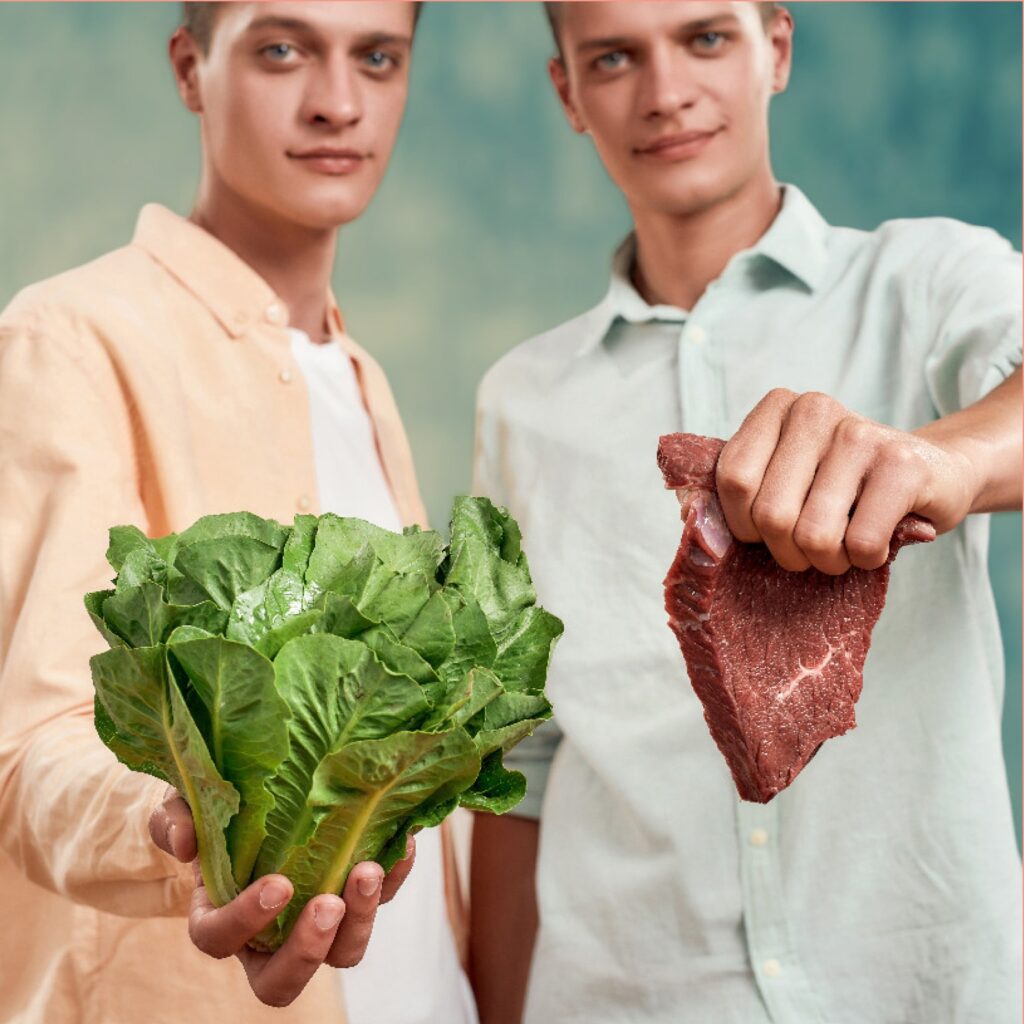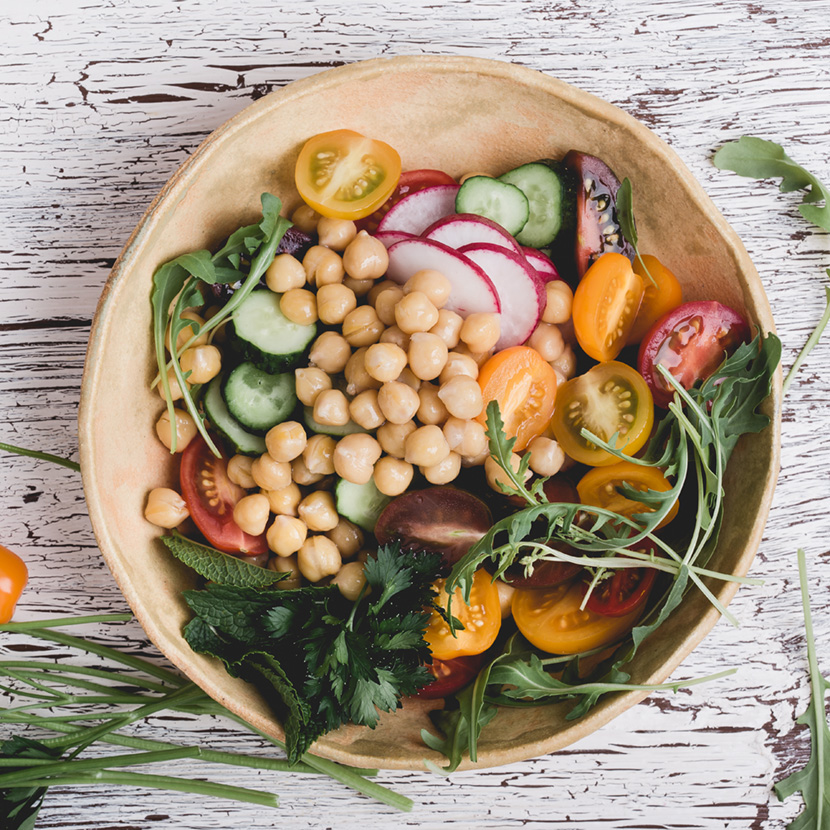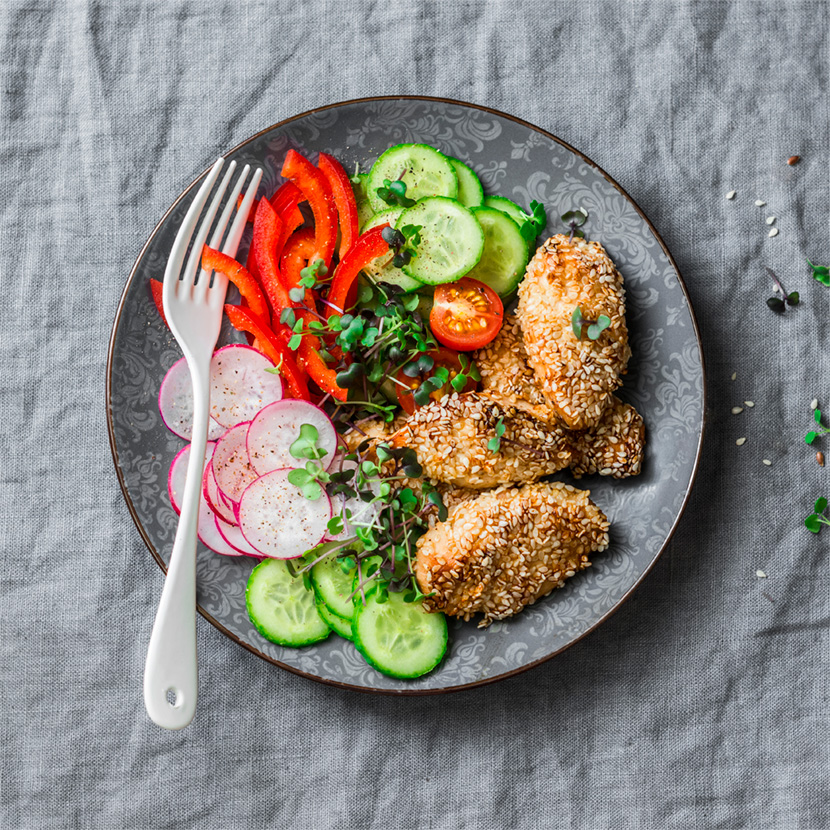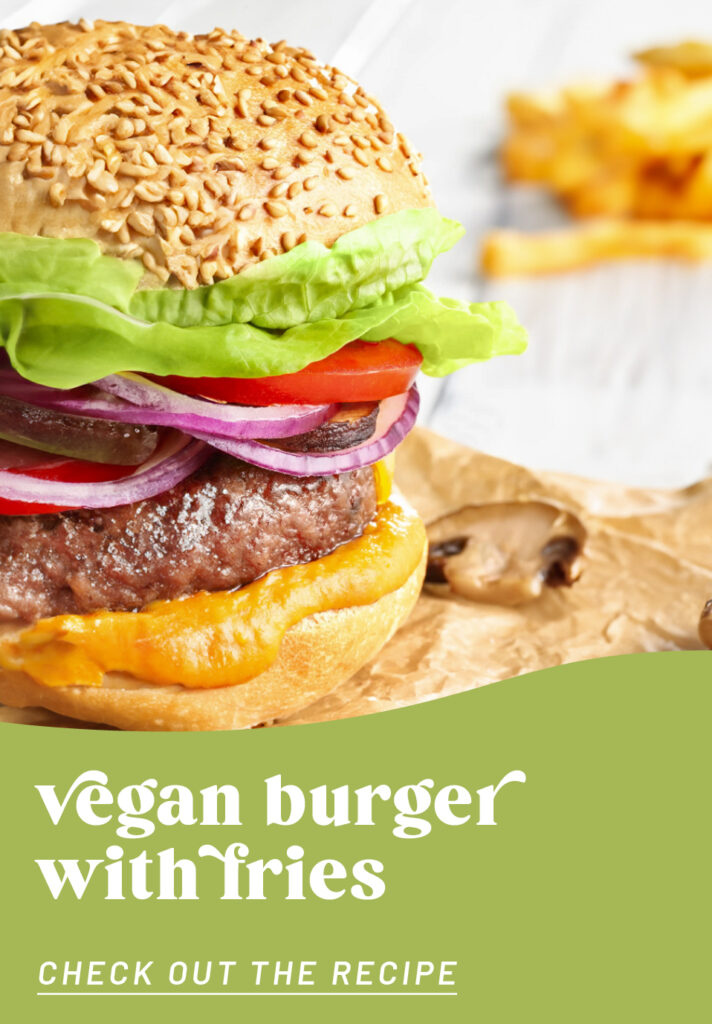V-STORY
Twins reveal the secrets of a vegan diet


Is a plant-based diet healthier? According to the science, it is, says the Netflix series “You are what you eat”
A recently published study by Stanford Medicine, led by Matthew J. Landry and his team, investigated whether a vegan diet really is healthier – and the results are as fascinating as the wide-ranging discussion about nutrition itself. So fascinating, in fact, that a four-part documentary about the study is now available on Netflix (“You Are What You Eat: A Twin Experiment”). It allows us to follow the scientists and participants every step of the way, and to find out what effects a vegan diet has on various aspects of life.
The question at the heart of it all is always: How can we research different diets as precisely as possible? How can we draw a truly precise comparison between a plant-based diet and one including animal products when people are so different, with totally different genes and attributes? That’s where twins come in! The world of research can be happy to have them. Read on to find out which extraordinary conclusions the scientists came to with the help of twins, and how a whole Netflix series has been created around the experiment, focusing on a range of different participants who signed up for the diet-based adventure.



The same, but different

As part of the study, which took place between May and July 2022, twenty-two pairs of identical twins entered into a culinary wrestling match against each other: vegan vs. omnivore, plant-based vs. animal-based. Don’t worry, though – there were no real wrestling matches 😉 Just forks, plates, and plenty of scientific curiosity. It’s important to note that the diets given to both groups were healthy, and contained fruit, vegetables and pulses. The choice of which twin would be omnivore and which would be vegan was made at random.
The vegan twins swapped their steak for seitan, their mince for chickpeas and their milk chocolate for the dark variety. Meanwhile, their omnivore siblings continued to eat all different types of foods. In addition to plant-based foods, this contained chicken, fish, eggs, cheese, milk and other animal products. Throughout the project, both groups had access to nutrition consultants and fitness coaches. What’s more, during the first month, the 44 participants in the study had their meals delivered to them. This helped them learn how to cook healthy meals for the rest of the research period. They also visited kitchen gardens to get to know different types of vegetables.
It’s clear from the Netflix documentary how much fun the twins had – whichever diet they were on. We meet Pam and Wendy, Carolyn and Rosalyn, Jevon and John, and surfer boys Charlie and Michael (the “cheese twins”, as they are both in the cheese business). The twins, who spend a lot of time with each other anyway, approach this challenge together too – only now, they no longer eat the same thing. The eight weeks of the experiment involve not only cooking and eating, but also regularly recording numerous types of data – relating to the microbiome, metabolism, blood values, circadian rhythms, visceral fat and several more. It’s great to be able to watch the documentary and see how it all happened, and how dedicated the participants were to the experiment. The latest high-tech experimental methods were used. By the end of the experiment, the scientists had come to a remarkable conclusion: the vegan twins were shown to have achieved an impressive improvement in several markers of health. We took a closer look!
Some hard facts for a green outlook
The participants were investigated according to various parameters. The focus was on sporting and cognitive performance, but also sex drive (which was also subject to stringent scientific tests ;-)) as well as important health criteria. So, which differences do the pairs potentially prove here?
When it comes to cognitive and sporting performance, the twins with an omnivore diet and those on a vegan diet score roughly the same. If cognitive and sporting prowess are all you’re interested in, it doesn’t make any difference whether you’re an omnivore or a vegan. In that case, other reasons might cause you to choose a plant-based diet, such as environmental concerns, sustainability, and animal welfare.
However, as soon as we get to the nitty gritty of preventing illness, the “vegan twins” have a clear advantage. Here are the top four benefits of a plant-based diet as highlighted by this Stanford study:

- Matters of the heart: Let’s start with LDL cholesterol – also known as “bad” cholesterol. While the omnivorous twins continued to struggle with relatively high LDL values, their vegan siblings had considerably lower values. So, why is this important? Low LDL levels are linked to a lower risk of heart disease – a bonus for your heart health!
- Life is sweet: Next, the scientists observed fasting insulin levels – an indicator of how efficiently our body processes sugar. In this regard, too, the vegan twins had lower values (about 20% lower), meaning their bodies are better able to process sugar. This is particularly important when it comes to avoiding Type 2 diabetes. You could interpret the results as meaning that the vegan diet gives you superpowers for fighting sugar!
- The incredible lightness of being: When it came to body weight, the plant-based twins lost more weight than their omnivorous siblings. Although weight loss isn’t the main aim of every vegan diet, it’s still a welcome side effect – especially when you consider that no calorie counting was involved! From a health perspective, it’s especially interesting to note that the twins on the vegan diet were able to decrease their body fat percentage, in particular the harmful visceral fat around their internal organs.
- Feeling younger: The team of scientists was able to prove that the indicators for biological (cellular) age, which is measured using the telomere length of chromosomes, changed significantly in the vegan group. Even though the experiment only ran for eight weeks, the vegan twins ended up biologically younger than their omnivorous siblings.
Christopher Gardner, a member of the research team who has been a vegan himself for 40 years, explained it like this: “A vegan diet can confer additional benefits such as increased gut bacteria and the reduction of telomere loss, which slows aging in the body.”[1] It’s Gardner that we get to know during the documentary, and who is on hand to give the participants valuable tips and information during the experiment.
Yet another encouraging result was that 21 out of the 22 participants in the vegan group made it to the end of the project as vegans, thus proving that in the space of two months, it is possible to learn to follow a plant-based diet, and positively influence your health.
Who carried out the study?
Maybe you’re thinking that there are countless studies about nutrition, which often come to contradictory conclusions. And you’d be correct – in part. However, it always depends on the type and scope of the research study in question. So, how good can we consider this twin study to be in terms of quality? The authors of the study „Cardiometabolic Effects of Omnivorous vs. Vegan Diets in Identical Twins: A Randomized Clinical Trial” are an impressive group of scientists with an outstanding collection of academic and professional qualifications. Just a handful of them are listed here:
- Matthew J. Landry PhD RDN – nutritional scientist with a doctorate
- Catherine P. Ward PhD RD – nutritionist with a doctorate
- Kristen M. Cunanan PhD – holds a doctorate in her field
- Lindsay R. Durand MPH RD – nutritionist with a Master of Public Health
- Dalia Perelman MS RDN – nutritionist with a Master of Science
- Jennifer L. Robinson PhD – holds a doctorate in her field
- Tayler Hennings MPH – expert with a Master of Public Health
- Linda Koh PhD MS RN – PhD holder and registered nurse with a Master of Science
- Christopher Dant PhD – PhD holder
- Christopher D. Gardner PhD – PhD holder and one of the main authors of the study
So, it’s safe to say that this group of researchers brings together a huge diversity of specialist knowledge in nutritional sciences, medicine, health and related disciplines, making the study particularly well-founded and credible. This should give critics of a vegan diet some food for thought!
Food for the future: Fun, flavor and sustainability

The documentary also tells us a great deal about traditional eating habits and industrial food production in the USA – which offer plenty of potential for being updated. The contrast between these habits and the participants’ healthy eating regime is quite eye-opening. Alongside the alarming examples of factory farming, however, the documentary also features organic farmers, and those producing meat and cheese substitutes. We also hear from chef Daniel Humm, whose Michelin-starred restaurant Eleven Madison Park in New York has been serving a purely vegan menu since 2021.
Again and again, however, the experts emphasize that no compromises should be made in terms of flavor and the joy of cooking. Not only are the twins given countless tips and ideas for plant-based cooking – we, the viewers, get to learn about them too. This is how Dr Christopher Gardner sums up his project and its trailblazing results: “Not only did this study provide a groundbreaking way to assert that a vegan diet is healthier than the conventional omnivore diet, but the twins were also a riot to work with,”.1
When only twins will do
The results of the study are particularly exciting because they were reached on the basis of genetically identical individuals. That means the scientists found a way to get around the influence of our genes, and to concentrate directly on the effects of diet. This is why science loves twins.
Similar experiments have been conducted in the past, on a smaller scale. In 2021, for example, the twins Hugo and Ross Turner compared vegan and omnivore diets over 12 weeks. During that period, Hugo lost 2kg (4.5lbs) thanks to the plant-based diet, and reduced his body fat percentage. So, this study was already pointing in the same direction as the new Stanford one – but the latter has broadened things to include 44 people, meaning it can be considered more significant.
Of course, even with twins, there are differences that need to be taken into account, such as habits. However, in the case of twins who grew up in the same household, it is often assumed that they will have similar lifestyles. And it’s absolutely clear that genetic differences can be ruled out. This culinary battle, which took place in the prestigious labs of Stanford University, has definitely shown us that the twins on the vegan diet not only became slimmer and reduced their body fat levels – they also had better control over their cholesterol and blood sugar levels, were shown to be biologically younger in chromosome tests, and scored better on the libido test. It was almost as though the vegan twins had developed green superpowers! There must be something behind it, don’t you think?

Feel the effects, keep going, and have fun

What impressed us the most was that in the space of just a few weeks, many of the participants (from both groups) had been motivated to eat a healthier diet which they were able to maintain, and which paid off in terms of their wellbeing. It was heartening to follow the lifestyle changes they made.
In this respect, science is a source of encouragement, and this documentary is proof of this – presented in an entertaining format. You really grow fond of the participants, as we’re told a bit about their personal backgrounds and their challenges and successes during the experiment. For example, it’s fascinating to hear that Wendy & Pam ate a lot of meat during their childhood in South Africa, and that they now both work as cooks. The fact that they managed to become vegan/more plant-based might inspire people to try out a different lifestyle.
Do you know any twins, or are you a twin yourself?
The number of views the Netflix documentary has just goes to show what an interesting topic this is. But what are your experiences? To bring this sumptuous scientific banquet to a close, here at Velivery we’d like to invite all you twins out there to share your stories. Whether you’re a fan of meat or of avocado toast, your experiences can help shed more light on the fascinating world of nutrition. So, let us hear your story! Who knows, maybe you’ll find out that your twin loves chickpeas just as much as you do! We look forward to hearing from you!
The Recipes
The big takeaway from the study is that your homemade vegan fast food at home will certainly taste just as good (if not better ;-)) and is guaranteed vegan. Why don’t you try out our „fast food“ recipes?



1Source: https://medizindoc.de/veganismus-verbessert-herz-kreislauf-gesundheit/
Zu Netflix: https://www.netflix.com/de/title/8113326














